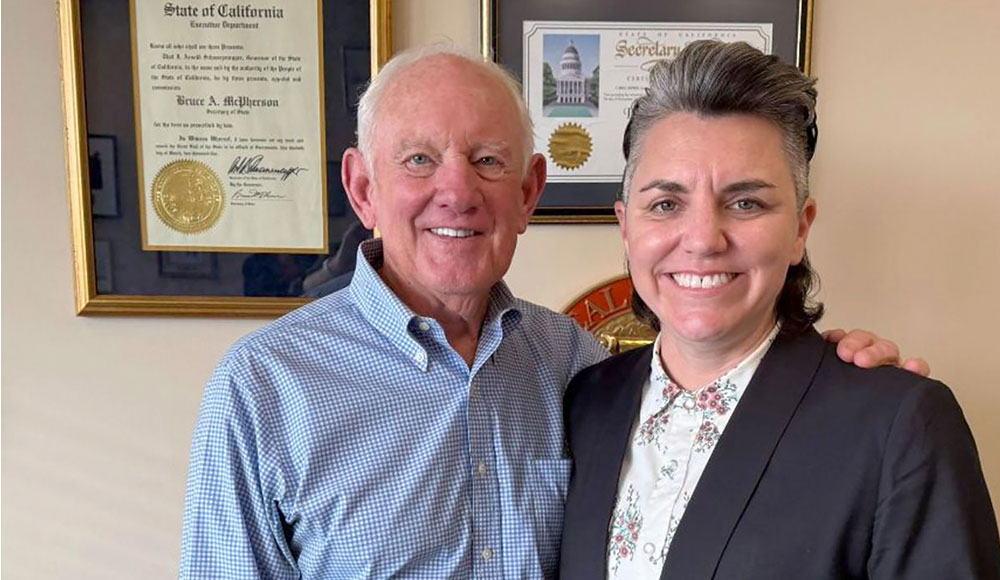December 30, 2024—Bruce McPherson’s last day as supervisor for the Fifth District of Santa Cruz County—dawned bright and blue. After bidding farewell to his team of analysts and taking down the last mementos from his office walls, McPherson traveled to Scotts Valley for his final interview to recount the highs and lows of his career.
“I feel very fortunate to have been in some form of service. I’ve had two primary careers over the past 50 years—I practiced journalism with the Santa Cruz Sentinel for 28 years, and then was in public service for the last 25. It’s been a blessing; I’ve enjoyed each of those careers because they bring something different every day, but I think being in the press really helped me in my political roles. Maybe it’s in my blood,” said McPherson, a fourth-generation Santa Cruz native, referring to his familial connection to both the Sentinel and the political scene.
The McPherson family owned the Sentinel from 1862 to 1982, carving a path for politically ambitious family members to not only have their voices heard, but also exercise influence in the political sphere of the county.
“I didn’t know I was going to get into politics—it was a surprise when I ran for the Assembly in 1993,” said McPherson, who clarified that the surprise was sprung upon his wife, Mary, to whom he has been married for 57 years. “I thought early on that being in the sports room and a reporter was enough, but when I started writing editorials for the paper, about two-thirds of them were focused on local issues, so I got a feel for what was going on. It was ever-changing and kept me on my toes. The excitement and the nature of constant change held my interest.”
McPherson’s father, Fred Jr., had run for State Assembly in 1932 and lost the contest by about 500 votes. In June of 1993, following a series of local shifts in the political landscape (Leon Panetta ascended from 17th Congressional District Supervisor to become President Bill Clinton’s Director of Office of Management and Budget, allowing Assemblyman Sam Farr to take the congressional representative’s seat in 1993), McPherson ran for Farr’s seat in a special election—and won.
When the election returns were broadcast on that June evening in 1993, Fred Jr. stood up, waved a towel in the air and bellowed, “It took us 60 years to get this seat, but it’s ours now.” Fred Jr. lived just a year after that election, and McPherson was thrilled that his dad was alive to see the results.
Grinning, McPherson recalled, “That was one of the greatest moments of my life.”
McPherson’s own transition to political practice came naturally following his time at the Sentinel. After leaving the paper, he served two terms in the California State Assembly (1993-96) and two terms in the California State Senate (1996-2004).
Following the resignation of California’s Secretary of State in early 2005, McPherson was confirmed unanimously in both the Assembly and Senate to be Secretary of State after being nominated by then-Gov. Arnold Schwarzenegger. As a Republican (Santa Cruz County was a red area until the 1960s) who later changed his political stripes to “no party preference” in 2012, McPherson found his stride in public service.
As Fifth District supervisor, McPherson was firm in his belief that local issues are not based on a political ideology, and that the Board of Supervisors is meant to serve the populace, not a party.
McPherson’s belief system was formed and nourished by the mentors in his life. Gordon “Scotchy” Sinclair, who joined the Sentinel in 1939 and became sports editor in 1941, was a huge influence for McPherson, as was the Cronkite-Brinkley-Rather era of news delivery.
“Back then, news was based on facts, not opinion. It’s just so different now,” remarked McPherson.
His journalism instructor at Cal Poly, John Healey, was another source of leadership.
“He was a fact-driven person who said not to release the story until you got the story right. He was a very important part of my life at that time,” recalled McPherson, who said Fresno’s Sen. Ken Maddy was another pivotal figure. “He was a moderate Republican, and I wanted to be just like him.”
McPherson recalled that some colleagues felt he was going backwards in his political career when he moved from state to local leadership with the Santa Cruz County Board of Supervisors, but McPherson disagreed.
“I could sense that politics were changing around that time, and I decided that I would be most comfortable in the supervisor’s seat. In fact, when I left the Senate, a fellow senator remarked that I was the most independent legislator in California, so I was coming into this new role with familiarity around governmental processes,” he said. “I quickly learned that as a county supervisor, you really need to know more about everything. In the county, you’re focused on issues like public safety, health and human services, parks—you have a buffet of issues that need your attention. You can’t let your mind wander, because something else is right around the corner.”
Those “something elses” materialized in rare form during McPherson’s tenure: floods, the CZU fire, earthquakes, tsunami-induced waves, atmospheric rivers—and yes, a tornado to top it off. Those issues restructured the way the Board of Supervisors operated over the past several years.
“We weren’t able to plan ahead; instead, we were working to get funding and resources to help communities impacted by natural disasters. Federal and state leaders determine the funding for disaster response, and the current structure is not the right one. FEMA has run out of money, and we need to adjust to a new reality. It seemed like we could hardly catch up, much less get ahead,” said McPherson, who noted that Santa Cruz County was owed over $100 million for road repairs going back seven years; the county has received about $50 million in repayment.
A former planning director once told McPherson that two-thirds of the mountainous roads in the Fifth District would not be permitted today, creating further funding challenges for the area.
For CZU victims, McPherson was frustrated by the addition of new county-based septic requirements for homes and other obstacles that impacted rebuild plans for residents.
“Santa Cruz County has the highest number of septic tanks west of the Mississippi, so to tell people that not only do they have to install a new system, but that it could run $75,000 to $100,000, and that material costs have doubled, and geological standards have been altered, which impact the permitting process, and the fire districts require a 14-foot wide road—it just became overwhelming for those residents, and understandably so. That’s been the most frustrating part of my time in the Fifth District,” said McPherson, adding that the permit process has been improving, but needs to be better. “I know that people will continue to work on that. I don’t want to make excuses, but those are the facts, and they really delayed what we wanted to accomplish.”

The Fifth District is in a more sensitive rebuild environment than other locales, and according to McPherson, much of that has to do with new laws that have been passed at the state level.
“I’m really troubled with the amount of housing Sacramento is demanding we build in the district. We’re not going to be able to put any of the new units in the San Lorenzo Valley, and we won’t be able to meet the numeric requirements due to infrastructure concerns and environmental concerns,” he said. “If we meet those housing goals in the next eight years, Santa Cruz County is going to look a lot different.”
McPherson referenced some of the new developments going up in downtown Santa Cruz: “A lot of people don’t like it, but it’s what we’ve been ordered to do, and we don’t have a choice in the matter.”
As part of state legislation aimed at easing the housing crisis, the county is tasked with permitting 4,634 new homes by 2032, drastically altering the landscape of the area. “The state taking over the land use operations of counties is really concerning,” McPherson said.
During his time as supervisor, McPherson was recognized as Legislator of the Year by numerous organizations and foundations and served on a slew of committees that supported his main areas of interest, namely education, the environment, public safety and small business growth. The cornerstone of his political approach, McPherson said, was based on sports.
“I grew up playing sports, and I learned that you win or lose as a team. People said I was known for my attitude of being a team player, and that’s something I’m proud of,” he added.
That tactic came in handy during his time in government.
“The thing I believe the most is that you can have your own opinions, but you need to hear and respect the opinions of those that are different from your own,” McPherson said. “Maybe that’s a throwback to my journalism days, but I really think open communication is critical when working with others. Compromise is the most important thing one can achieve, and we need more of that today. Everyone could use a little more grace.”
In closing, McPherson became emotional when talking about wrapping up his time in public service.
“I was lucky enough to be born in the greatest place on the planet. I remember my dad saying to me, ‘We’re in a good position to make it better. Let’s just leave it better than we found it.’ My staff and I worked hard to achieve that goal, and I am grateful to all of them—and all of the agencies I worked with—for their tireless efforts under challenging circumstances,” he said. “These last five years have been unlike my first 20, and I really appreciate the cooperative ventures I’ve experienced with them all. The successes I’ve had are due to the people I’ve worked with.”
McPherson acknowledged the role his wife, Mary, played in his success.
“If it wasn’t for the support of Mary and my family, I wouldn’t be where I am today. I love this county. My family has been here for over 170 years, and I couldn’t imagine living anywhere else. I don’t know what I’ll do in the future, but I plan to spend more time with my family and give myself some time to figure out what comes next,” McPherson mused. “I’ve met eight presidents, a dozen governors, and hopefully I’ve served the people well. Santa Cruz County has nearly 800 nonprofits, so there’s room for folks to volunteer and give back to this amazing place. We’re a giving community, and we’re better for it.”













All the public near and far are lucky to have a representative like Bruce McPherson make our world just a little bit better.
He’s a public servant who has served us well. Congratulations Bruce!